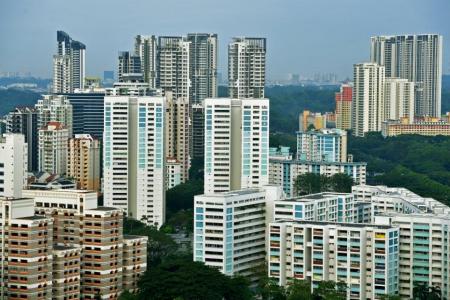One in three resale flat buyers paid above valuation this year
This is a rise from 1 in 5 last year, with prices for such flats steadily rising
About one in three buyers of a Housing Board resale flat has paid above market valuation this year, an increase from one in five last year.
The increase comes against the backdrop of steadily rising prices for such flats.
The median cash over valuation (COV) paid by buyers remains at $0 each year, figures released by the Ministry of National Development (MND) in a written parliamentary reply last Monday showed.
But the proportion of buyers who paid COV increased, reflecting the current broad-based demand for housing, including private housing, supported by the low interest rate environment, said MND.
DIFFERENCE
COV is paid when a resale flat is sold above its actual HDB valuation; the difference can be paid for only in cash by the buyer.
If buyers and sellers have agreed on a resale price that is equal to the market valuation of the flat, buyers do not have to pay COV.
From January last year to April this year, fewer than one in four resale flat buyers paid above market valuation for their flat, said MND in another written parliamentary reply last Tuesday.
Among these, about four in 10 buyers paid COV of more than $20,000, data from MND showed.
In the 16-month period, about 34,600 resale flats changed hands, said Ms Christine Sun, senior vice-president of research and analytics at OrangeTee & Tie, citing HDB data.
This translated to about 8,600 buyers who paid a COV, and among these, about 3,400 paid more than $20,000, Ms Sun said.
"Whether $20,000 COV is high or low depends on the base price. For a $1 million flat, maybe it is reasonable. For a $300,000 flat, it is quite substantial. More detailed data is needed to properly gauge the impact," she said.
Mr Alan Cheong, head of research and consultancy at real estate company Savills Singapore, also said that more data on COV is needed for a full and accurate picture.
For instance, the number of buyers who paid COV may drastically increase if the timeframe started from the third quarter of last year instead of the first quarter, he said.
This is because the resale market was "still sleeping" in January last year, and resale prices started accelerating only in the third quarter of last year, when Singapore came out of a two-month circuit breaker period.
In its reply last Monday, MND said that the current proportion of buyers who paid COV is "significantly lower" compared with the period between 2010 and 2013.
Then, almost all HDB resale buyers paid COV, MND said.
This was because the practice was for sellers to obtain a valuation from HDB and negotiate COV with the buyers to determine the resale price.
Since 2014, the rules have changed. Both parties now have to agree on the resale price before obtaining a valuation from HDB, which will determine the loan amount and Central Provident Fund savings that can be used for the purchase.
Should buyers choose not to proceed with the transaction after getting the valuation - and asserting the COV payable - they will have to forgo the option fee of between $1 and $1,000 paid to the seller.
ERA Realty head of research and consultancy Nicholas Mak said the bullish resale market now lends itself to higher COV, as demand for resale flats outstrips supply.
Long construction delays plaguing Build-To-Order projects, as well as increased numbers of returning overseas Singaporeans and new permanent residents, have driven up demand for resale flats, he said.
As a result, rising COV may price out those who are not "cash rich", he added.
Said Mr Cheong: "Valuation is done based on past transactions, but sellers look forward to projected prices. So when the market starts rising, sellers will ask for higher COV and buyers will anticipate paying more COV."
Get The New Paper on your phone with the free TNP app. Download from the Apple App Store or Google Play Store now

